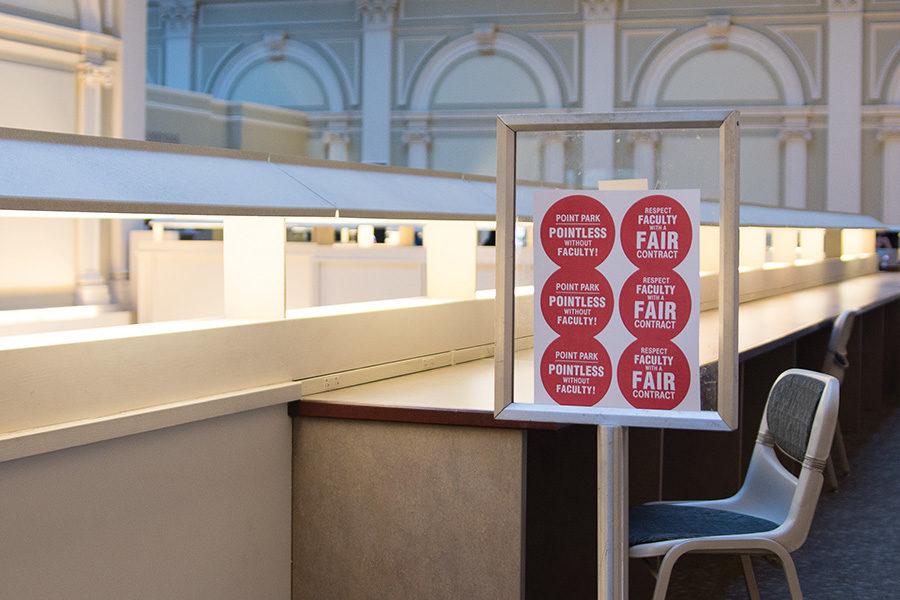Faculty union don stickers in protest
Photo by Julie Kooser
Stickers printed by the Point Park University full-time faculty union stand on display in Unversity Center on Monday. Union members say negotiations with the administration have moved slowly.
September 13, 2016
Reacting to a summer of stalled negotiations with Point Park University’s administration, full-time faculty members wore stickers Monday in an organized effort to move the collective bargaining process forward for their first union contract.
Full-time faculty members wore one of two separate stickers, which were distributed by the union steering committee, throughout the day. The stickers were white text against a red background.
One sticker read “Point Park – Pointless without Faculty!” and another read “Respect Faculty with a Fair Contract.” The stickers were distributed to all full-time faculty members included in the collective bargaining agreement with the university, about 140 in total.
Michael A. Fuoco, president of the Newspaper Guild of Pittsburgh and an enterprise reporter for the Pittsburgh Post-Gazette, called the move a “mobilization effort,” and a small one at that.
“It’s a very concise message,” Fuoco said. “It is two-fold – to show the administration that we’re united, and it’s somewhat of a bonding exercise.”
“It’s a way to say there’s a lot of us, and we’re here and we’re present,” said Karen Dwyer, associate professor of creative writing. “It’s a way to represent out numbers.”
Dwyer was one of four full-time faculty members present at a negotiating session Friday morning. Point Park professors Bill Purcell, John Rice and Bob Ross were also at the negotiations as faculty representatives.
“It felt good to be back at the negotiating table, especially after a very long summer of not a lot of progress,” Dwyer said.
Negotiating sessions since Mar. 17 between Point Park University and its full-time faculty have failed to produce a new contract. The negotiations come after an 11-year legal battle between the school and the Newspaper Guild of Pittsburgh-Communication Workers of America, the full-time faculty’s union. Point Park initially refused to negotiate with the faculty union, arguing that the staff was viewed as managerial employees and ineligible for unionization.
Ross, an associate professor of global cultural studies, said that the sticker demonstration Monday was in part a response to the university’s legal battle with the union.
“The university spent exorbitant amounts of money for more than a decade fighting our union in court in order to prevent the faculty from engaging in the collective bargaining process,” Ross said.
The faculty union’s steering committee also planned the sticker demonstration in an effort to get faculty who aren’t at the negotiating table an opportunity to get involved in some form.
“We’re trying to find a way, given how tense the situation is and how unfruitful the summer negotiations went, to permit people to participate,” Dwyer said.
Representatives for the university and faculty union sat down on Friday morning to continue negotiating on a new contract. The two sides have negotiated about a dozen times since March.
“Friday was one of the better days we had,” said Purcell, a humanities and human sciences professor. “We have an awful lot of important work to do that needs to be done. This is a really critical time for the university.”
Point Park declined to comment on the demonstration by faculty Monday or the current state of negotiations.
“As we work through the early stages of negotiation on a contract, university leadership will respect that process by confining talks to the bargaining table,” the university said in a press release sent to the Globe in August.
The two sides have two more negotiating sessions scheduled in September and are working on scheduling more frequent meetings in October, according to Purcell.
“There’s a long road to go,” Fuoco said. “We’re hopeful that these negotiations proceed in a positive manner.”
Still, the faculty union has contingency options if the contract negotiations stall or fall apart completely, according to Fuoco.
“There’s a whole range of things [we can do]. They go from the benign to nuclear. Right now we’re in the benign stage,” Fuoco said. “There will be more visible mobilization events. They might come every week. They come depending on how negotiations are doing.”


















